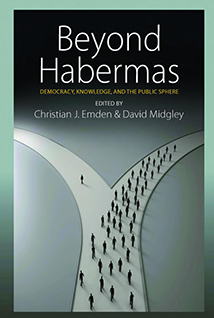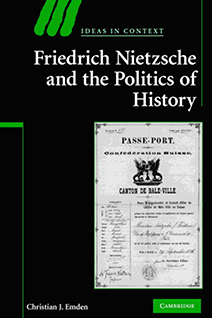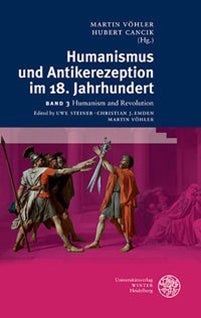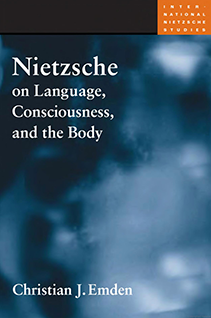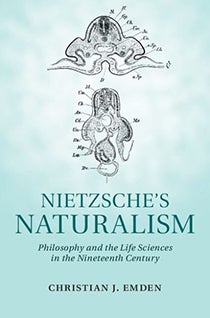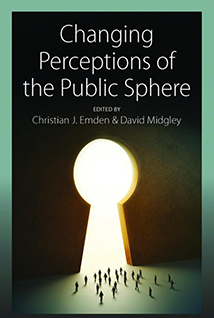Education
- PhD, University of Cambridge, UK
Research and Teaching
- Modern Intellectual History
- Political Thought
- European Philosophy since 1750
Recent Courses
- PLST 302 Contemporary Political Theory
- PLST 301 Modern Political Thought
- GERM 420 German Politics and Culture after 1945
- GERM 333 Nietzsche
Christian J. Emden’s work falls into the fields of modern European and German philosophy, intellectual history, and political thought. He is one of the founding directors of Rice’s Program in Politics, Law & Social Thought.
He is currently finishing a longer book project on the political dimension of philosophical nihilism since the eighteenth century, Philosophical Nihilism and Political Thought, 1750-1960, and a second book project that is focused on a critical genealogy of“civil society” in the history of democratic theory from Aristotle to Kant and Hegel. A third book project, Hannah Arendt, Political Theory, and American Empire, is focused on Arendt’s writings as a public intellectual in the context of American political life during the 1950s and 1960s. Also in the making is a short volume on Nietzsche and History for Cambridge University Press.
Emden is one of the chief editors of the journal Nietzsche-Studien and he is also on the editorial board of the Journal of Nietzsche Studies. Previously, he was on the editorial boards of the Zeitschrift für Kulturphilosophie and Modern Intellectual History.
Selected Publications
1. Books and Edited Volumes
- Democracy and the Limits of Community (Cambridge: Cambridge University Press, forthcoming in 2025).
- Ed. with Keith Ansell-Pearson, Nietzsche and the Ethics of Naturalism, special issue of Journal of Nietzsche Studies 47 (2016).
- Ed. with Uwe Steiner and Martin Vöhler, Humanism and Revolution: The Eighteenth Century and Its Transatlantic Legacy (Heidelberg: Carl Winter, 2015).
- Nietzsche’s Naturalism: Philosophy and the Life Sciences in the Nineteenth Century (Cambridge: Cambridge University Press, 2014). Paperback edition 2019.
- Ed. with David Midgley, Beyond Habermas: Democracy, Knowledge, and the Public Sphere (New York: Berghahn, 2012). Second edition 2014.
- Ed. with David Midgley, Changing Perceptions of the Public Sphere (New York: Berghahn, 2012).
- Friedrich Nietzsche and the Politics of History (Cambridge: Cambridge University Press, 2008). Paperback edition 2011. Turkish translation 2013. Chinese translation forthcoming in 2022.
- Walter Benjamins Archäologie der Moderne: Kulturwissenschaft um 1930 (Munich: Wilhelm Fink, 2006).
- Nietzsche on Language, Consciousness, and the Body (Chicago: University of Illinois Press, 2005).
2. Journal Articles and Book Chapters
- “Naturnotwendigkeiten: Nietzsche über die metaphysischen Bedingungen der Normativität,” in Vanessa Lemm and Antonia Ulrich (eds.), Nietzsches Naturen (Berlin: De Gruyter, 2024), 99-124.
- “The Political Romanticism of the Common,” MLN 139 (2024), 519-36.
- “Histories of Violence: Nietzsche on Cruelty and Normative Order,” in Anthony K. Jensen and Carlotta Santini (eds.), Nietzsche on Memory and History (Berlin: De Gruyter, 2021), 209-37.
- “The Dangerous Political Theology of American Exceptionalism: Human Rights, Religion, and the Pitfalls of Contemporary Conservatism,” Telos 193 (Winter 2020), 133-54.
- “Romanticizing the Republic: Hannah Arendt on Freedom, Rights, and the Modern State,” in Kei Hiruta (ed.), Arendt on Freedom, Liberation, and Revolution (New York: Palgrave Macmillan, 2019), 79-113.
- “Nihilism, Pessimism, and the Conditions of Modernity,” in Warren Breckman and Peter E. Gordon (eds.), The Cambridge History of Modern European Thought (Cambridge: Cambridge University Press, 2019), vol. I, 372-97.
- “Nietzsche, Truth, and Naturalism,” in Tom Stern (ed.), The New Cambridge Companion to Nietzsche (Cambridge: Cambridge University Press, 2019), 273-301.
- “Agency Without Humans: Normativity and Path Dependence in the Nineteenth-Century Life Sciences,” in Edgar Landgraf, Gabriel Trop, and Leif Weatherby (eds.), Posthumanism in the Age of Humanism: Mind, Matter, and the Life Sciences after Kant (London: Bloomsbury, 2018), 53-77.
- “Nietzsches Katharsis: Von der Tragödientheorie zur Anthropologie der Macht,” Nietzsche-Studien 47 (2018), 1-48.
- “Normativity Matters: Philosophical Naturalism and Political Theory,” in Sarah Ellenzweig and John H. Zammito (eds.), The New Politics of Materialism: History, Philosophy, Science (New York: Routledge, 2017), 269-99.
- “Nietzsche’s Will to Power: Biology, Naturalism, and Normativity,” Journal of Nietzsche Studies 47 (2016), 30-60.
- “Die Normativität des Kapitals: Zur politischen Aktualität von Georg Simmels Philosophie des Geldes,” Zeitschrift für Kulturphilosophie 9 (2015), 179-205.
- “Postnational Constellations? Political Citizenship and the Modern State,” in Robert Nichols and Jakeet Singh (eds.), Freedom and Democracy in an Imperial Context: Dialogues with James Tully (London: Routledge, 2014), 121-43.
- “Land, Race, and Citizenship: The Political Spaces of Monumentalism in South Africa,” Anglia 131/2-3 (2013), 1-40.

